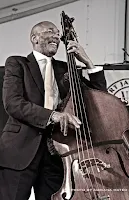Ron Carter, (Ronald Levin Carter - 4 de mayo de 1937) the virtuoso of the jazz bass, stands as an indomitable force in the annals of music history. With over 3500 albums to his name, Carter's influence on the jazz genre is nothing short of revolutionary, rivaling the likes of Milt Hinton, Ray Brown, and Leroy Vinnegar. As a professional melophile, I had the privilege of exchanging words with this maestro during the “Jazz Festival of Lapataia in Maldonado city, Uruguay, Latin America (2009)”
The
encounter left an indelible mark on my perception of music,
particularly jazz, and revealed the depth of Carter's mastery.
Post his tenure with Miles Davis, Carter's musical odyssey continued with prolific contributions to the CTI label, collaborating with an eclectic array of artists such as Herbie Mann, Paul Desmond, George Benson, and Antonio Carlos Jobim. His discography reads like a who's who of jazz, featuring collaborations with luminaries like Billy Cobham, Stan Getz, and Coleman Hawkins, among others.
Beyond the realm of jazz, Carter's versatility shines. From performing with B.B. King to engaging in film scoring, his musical palette embraces a kaleidoscope of genres. His chameleonic ability to seamlessly transition from jazz to classical, evidenced by his prowess as a cellist, further underscores the depth of his artistry.
As a leader, Ron Carter's significance is underscored by more than 25 albums bearing his name. His influence extends beyond his instrument, evident in his Grammy-winning collaborations, including the Miles Davis Tribute Band and the instrumental composition "Call Sheet Blues" for the film "Round Midnight."
Carter's commitment to musical education is as noteworthy as his performance prowess. His authorship extends to seminal works like "Building Jazz Bass Lines" and "The Music of Ron Carter," offering aspiring musicians insights into his creative process. As a distinguished professor emeritus, Carter has shared his wisdom at esteemed institutions like the Thelonious Monk Institute of Jazz Studies, the City College of New York, and the Juilliard School.
The accolades bestowed upon Carter mirror the magnitude of his contributions. Grammy Awards, a Guinness World Record for the most recorded jazz bassist, international honors from Japan and France, and seven honorary doctorates attest to the global impact of his musical legacy.
Certainly, let's delve deeper into the profound impact Ron Carter has had on the musical landscape:
In essence, Ron Carter's life can be likened to a meticulously
composed symphony, where each note resonates with dedication,
innovation, and collaboration. His journey through the realms of jazz
and beyond is not just a personal narrative; it's a narrative that
echoes through the corridors of musical history. As we traverse the
intricate web of his career, it becomes abundantly clear that Ron
Carter is not merely a bassist; he is the master orchestrator who has
woven himself into the very fabric of modern music.
Carter's dedication to his craft is palpable in every pluck of the
bass strings. His relentless pursuit of musical excellence, honed
over six decades, is not just a testament to his technical prowess
but a commitment to the continual evolution of his art. It's a
dedication that has not waned over time but has rather matured like a
fine wine, enriching the musical experience for both the artist and
the listener.
The innovation that defines Carter's contribution extends beyond the boundaries of any single genre. His ability to seamlessly navigate through jazz, classical, and even the vibrant hues of film scoring showcases a creative spirit unconfined by musical borders. In doing so, he has expanded the possibilities of what the bass can convey, introducing novel expressions and tones that resonate far beyond the traditional expectations of his instrument.
Collaboration, another key note in Carter's symphony, underscores his ability to connect with a myriad of musical minds. His extensive discography reads like a collaborative anthology of the who's who in the music industry. From Miles Davis to B.B. King, Carter has not just played alongside these legends; he has engaged in a musical dialogue that transcends mere accompaniment. Each collaboration is a testament to his adaptability and the universal language that music is—an interplay of diverse voices converging into harmonious unity.
As we survey the vast expanse of Carter's influence, it becomes apparent that his bass lines are not confined to the stage or the recording studio; they resonate in the hearts and minds of those who have been touched by his music. His indelible mark on the musical landscape is not just about the notes he plays; it's about the emotions he evokes, the narratives he weaves, and the universality of the language he speaks through his instrument.
Ron Carter's life is more than a biography; it's a
testament to the enduring power of music to transcend boundaries and
create connections. He stands as the maestro not only of the bass but
of a musical narrative that continues to unfold, leaving an
everlasting imprint on the very soul of modern music.
Website https://roncarterjazz.com/
"Actual Jazz" https://actualjazz.blogspot.com/2009/02/ron-carter-bass.html




No hay comentarios:
Publicar un comentario